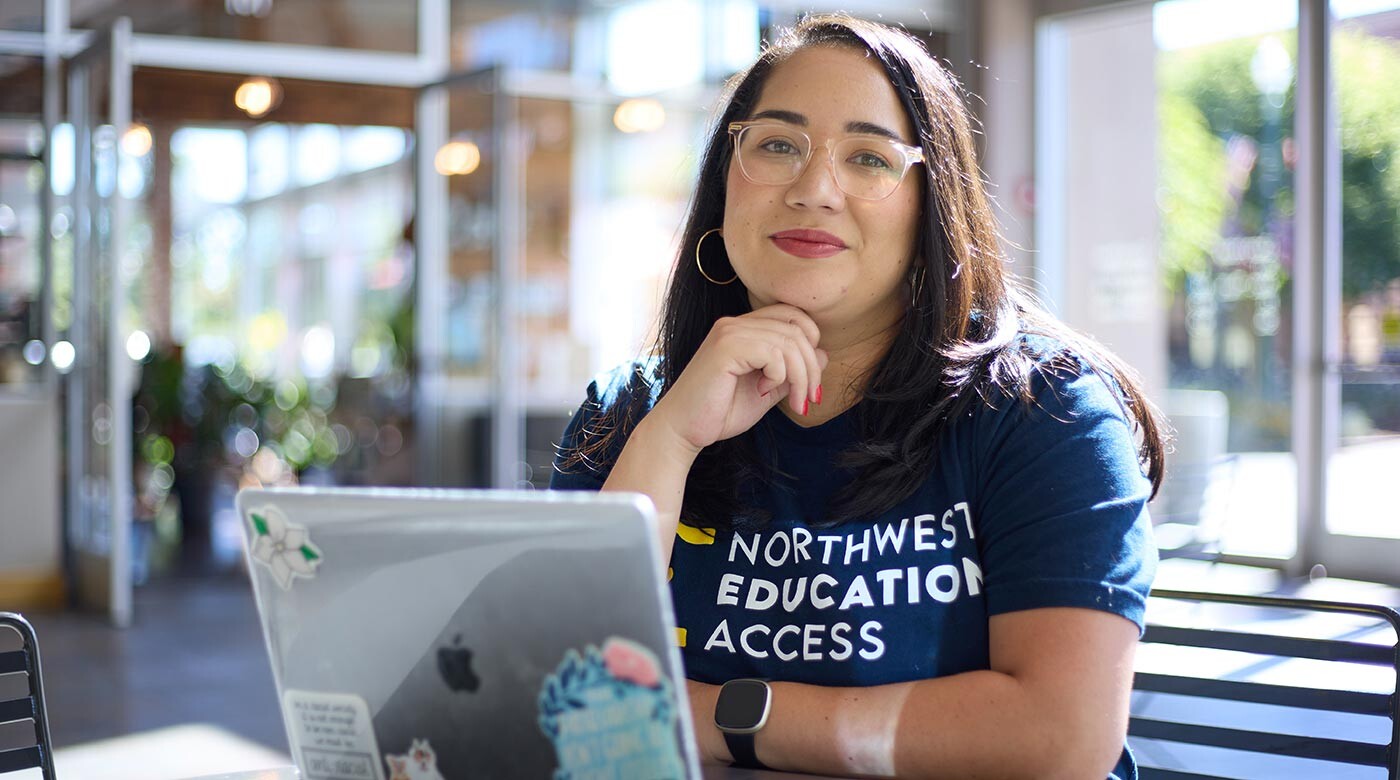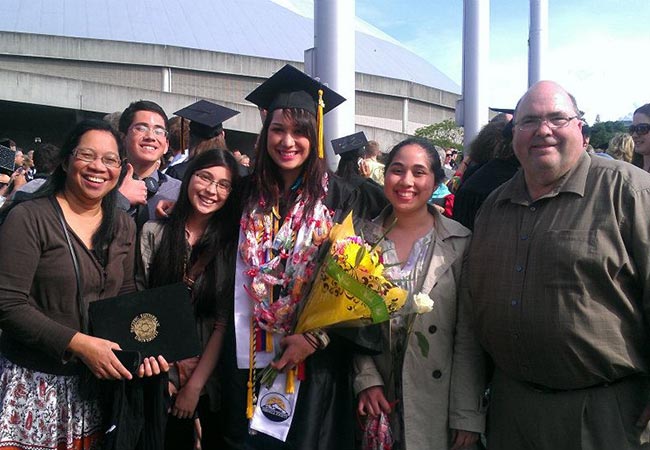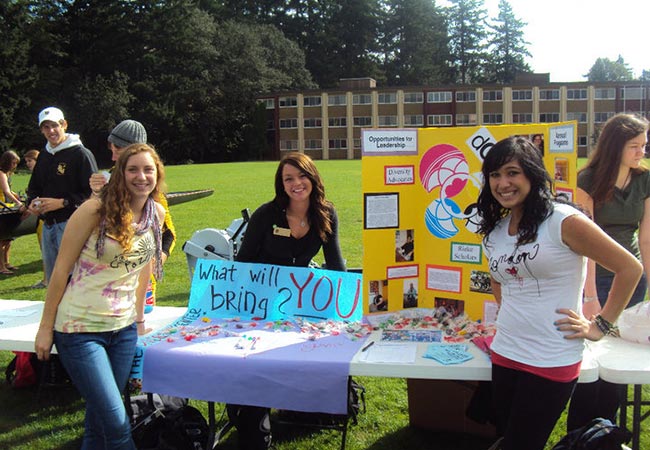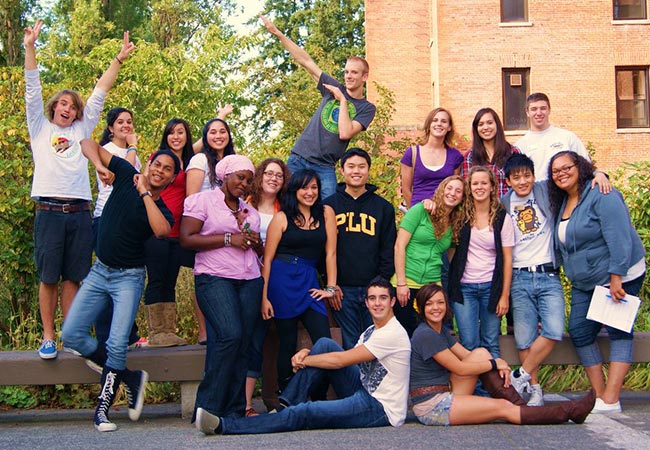Questioning Barriers: Angela Pierce-Ngo ’12 understands post-secondary success requires questions

By Lora Shinn
ResoLute Guest Writer
While at PLU, Angela Pierce-Ngo ’12 was worried by a troubling pattern. After the first year of college, many peers and friends — especially classmates of color — left school or took an extremely long break.
Even as she worked as a diversity advocate and progressed toward her degree in social work, she felt concerned about those missing from classrooms. She wrote a paper on why students of color might leave school and college. Pierce-Ngo assisted in coordinating the Students of Color Retreat and encouraged more peer support.
But she found her true calling after graduation when Northwest Education Access hired her through Americorps.
She says there’s a stigma associated with leaving school. She’s more interested in turning a judgmental statement of “school not working for the student” into two tough questions: Why didn’t school work for this student? And how can we better support a population that often falls through the cracks?
While many programs support struggling high school students, fewer programs exist for those aged out of the high-school population or who face significant barriers, such as early parenthood.
“How can we support young people that traditional high school doesn’t work for, and continue to support after high school ends?” Pierce asks. “Why are students of color and students with more barriers leaving? How can we continue to provide and do better? Who are we not including, not asking?”
Pierce-Ngo started her career providing one-on-one counseling to students who left school, then later moved into other roles that eventually led to program planning and supervision. The past 10 years have passed quickly, and now Pierce-Ngo serves as the program director of Northwest Education Access.
Northwest Education Access supports low-income young people and helps them plan and begin post-secondary education paths. The organization works outside the K-12 system through community partnerships and open-door re-engagement programs that help students get a high-school diploma or GED. Many are low-income and experiencing other barriers, too, such as unstable housing, immigration status, parenting or expecting a child.
“I’m proud of the work we have done in supporting students, long-term,” Pierce-Ngo says. Data shows that the program works, too. Thanks to the unique one-on-one support model, the students were three times more likely to pursue post-secondary education.
A Northwest Education Access advocate is a designated support person, who uses one-on-one conversations and follow-up check-ins. Advocates help a caseload of 40-60 students navigate financial aid, tuition, school transfers, or coping with academic disruptions such as COVID-19-induced closures.
When Pierce-Ngo started as an education advocate, she met students where they were. To develop strong, trusting relationships, meetings might take place in a coffee shop, library, food truck or on breaks at a mall job.
The advocate gathers information on the student — their interests, goals, and what did and did not work for them in school before leaving. Students meet with an advocate once a week or so at first, then about once a quarter after entering a program.
There’s a common misconception that those who left school are uninterested in more school — but Pierce-Ngo notes that recent research showed that 95% of South King County youth surveyed indicate interest in further education.

Angela Pierce-Ngo with her parents at PLU Commencement in 2012.

Angela Pierce-Ngo tabling with the Diversity Center during a student involvement fair.

Angela Pierce-Ngo (center, black tank top), with her fellow 2010-11 Rieke Scholars.
Northwest Education Access works with the youth to determine the best next steps in career exploration — whether that is further traditional higher education, a training program, a short-term professional technical program, or an apprenticeship.
After all, the traditional college classroom isn’t for everyone. While some students love writing essays, others work best with their hands and thrive in technical programs.
“We have students come to us at 27, working and with a family, but decide it’s the right time to return. After experiencing life and the workforce, they say, ‘Now I know what I want to do.’ Career exploration is a lifelong process. But schooling hasn’t changed in 100 years,” she says. “So how can we adapt and shift what education looks like? There are many ways to learn other than through a four-year degree.”
Even obtaining financial aid can be a byzantine, contradictory process that goes a little smoother with an advocate by a student’s side. For example, many schools in 2014 didn’t have up-to-date information when undocumented students began qualifying for state financial aid. “We’re walking along with students on their journey, in a near-peer relationship,” she explains. “It’s like supporting a cousin or sibling, so there isn’t a power dynamic.”
Although no longer in an education advocate role, Pierce-Ngo still acts as an advocate to students she’s worked with in the past. Two students are even in graduate school at the moment. The program expanded to Tacoma-Pierce County in 2020, where Pierce-Ngo lives with her six-month-old baby, husband, and two dogs — and where she grew up. “It was exciting to officially expand and offer services here, to create buzz and awareness around the opportunity youth population,” she says.
“I was 17 when I applied to PLU, and college is such a big life decision,” she says. “You can’t vote, can’t drink at 17 — but you’re still making such a big life decision.”
She hopes to normalize a “nontraditional timeline” and education at any age. “As we continue to explore, we figure out our goals, but even those change. If students don’t graduate from a traditional school setting, what alternatives and approaches can we offer?”


